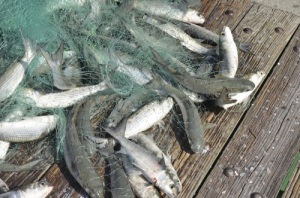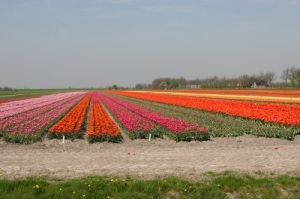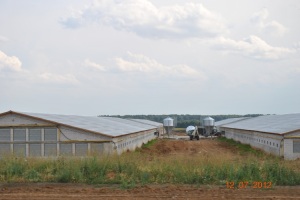وورلد لوكالاسبوع44 ـ 2014
سأبدأ هذا الأسبوع بأخبار من أوربا. فقد باشرت الزميلة الأورو – برلمانية آنيا أُويهاند المعركة لأجل فرض حظر على عملية الصيد الضخمة باستعمال شباك واسعة. عدد لا يحصى من سمك السيف والتونة يواجهون الموت البطيء بتلك الشباك الضخمة. كذلك الطيور، الدلافين، الحيتان والسلاحف البحرية يقعون ضحية عن غير قصد يختنقون ويموتون بشكل بطيء.

قررت الأمم المتحدة عام 1992 بوجوب حظر الشباك الخيشومية للصيد، وذلك بسبب الصيد اللامحدود والعدد الهائل للكائنات الأخرى التي تذهب ضحية هذا النوع من الصيد. لكن الإتحاد الأوربي وحتى اليوم لم ينظف مياهه بشكل نهائي من تلك الشباك. وللتخلص نهائيا من الشباك الخيشومية تقترح الآن اللجنة الأوربية المنع الكلي. عظيم! لكن الوضع يبقى مثيرا، وذلك لأن بعض الأحزاب تسعى لمنع حظر تلك الشباك.
الزميلة آنيا أُويهاند قدمت أيضاً اقتراحا برفض الإتفاق التجاري مع كندا إذا ما لم يتم وضع حظر على استيراد النفط الرملي. ويعتبر هذا الأخير النوع الأكثر تلوثا على وجه الأرض، حيث يبعث ثلاث حتى خمس مرات ثاني أوكسيد الكاربون من النفط التقليدي.

تم مؤخراً إبرام اتفاقية التجارة الحرة بين الإتحاد الأوربي وكندا، وبذلك أصبح القرار المتفق عليه لحظر استيراد النفط الرملي مستحيلا. لذا نريد من حكومتنا عدم توقيع اتفاقية التجارة الحرة مع كندا!
ونبقى بعض الشيء في أوربا. لأنه في الأسبوع الماضي طرحنا أسئلة الغرفة حول الدعم الأوربي لتعزيز الزهور التي تحتوي على كمية كبيرة من السم. مكتب الزهور هولندا يتلقى في الحقيقة تمويلا من الإتحاد الأوربي للحملة الترويجية. الميزانية تقدم من خزينة الدعم الزراعي الأوربي المخصص للتغذية ( وبالتالي ليس للزهور ). نحن لا نفهم بأن يُلزم دافعي الضرائب بالمساهمة.

في زراعة الزنابق مثلا ( التي تروج بمال الضرائب ) يتم سنويا استخدام 100 كلغ تقريبا في الهكتار الواحد، مع كل التبعيات السلبية على مستوى الصحة العامة، جودة المياه والتنوع البيولوجي. نريد من الحكومة أن تمضي شكوى باللجنة الأوربية لمناهضة ترويج الزهور.
كذلك طرحنا الأسبوع الماضي أسئلة حول الإستثمارات الغير المباشرة لمسؤولين عبر المعاشات التقاعدية في الأقفاص البطارية والإسطبلات الضخمة خارج البلاد. مكتب الأبحاث Profundo قام ببحث تبين من خلاله أن المؤسسات المالية الهولندية تستثمر في الإصطبلات الضخمة وفي تطوير الصناعة الحيوية بالخارج.

وقد فهمنا على سبيل المثال أن صندوق التقاعد للمسؤولين الهولنديين المساهم الرسمي للإسطبلات الضخمة BRF في البرازيل. تلك الإسطبلات لا تحتوي على أي تشريعات في مجال الرعاية الحيوانية. كذلك كان هذا الصندوق المساهم لـ بوكهاند تشاروين التايلاندية (Charoen Pokphand )، التي تبني الأقفاص البطارية الضخمة بالصين. أيضاً كان لهذا الصندوق على مدى الأربع سنوات الأخيرة روابط بشركة اللحوم البرازيلية Marfrig Alimentos. يتبع!
تحياتي! ماريان
This week I would like to start with news from Europe because our MEP Anja Hazekamp has started fighting for a ban on mega fishing nets. Numerous swordfishes and tunas get stuck and struggle against death in these giant fishing nets. But also birds, dolphins, whales and sea turtles become entangled in these nets and slowly die of suffocation.

The United Nations already decided in 1992 that the use of driftnets had to be prohibited because it caused overfishing and massive by-catches. But the European Union still hasn’t had the nets removed from its waters. The European Commission is now proposing a complete ban to stop the use of driftnets permanently. Brilliant! But it still isn’t over yet because a large number of parties in the European Parliament are trying to block the ban on driftnets 🙁
Additionally, my colleague Esther Ouwehand filed a motion to not enter into a trade agreement with Canada if they do not observe the import ban on tar sands oil. Tar sands oil is the most polluting fossil fuel on earth, representing three to five times the CO2 emission of conventional oil.

The European Union recently entered into a Free Trade Agreement with Canada, which makes the agreed import ban on tar sands oil impossible. That’s why we call on our government to not ratify the Free Trade Agreement with Canada.
And we’re not leaving Europe yet. Last week we raised parliamentary questions about the European subsidies for the promotion of flowers that contain many toxins. It is a fact that the Bloemenbureau Holland (Flower Council) receives subsidy from the European Union for its promotion campaign. The budget is received from the subsidy scheme for European agricultural products and is especially intended for food (thus not for flowers). We can’t understand why the taxpayer has to contribute to this.
For example, 100 kilos of agricultural pesticides per hectare are used for the breeding of lilies (which are promoted with tax money) on an annual basis, with all associated consequences for public health, the quality of water and biodiversity. We call on our government to lodge a notice of objection with the European Commission to the promotion of flowers!
Last week we also raised questions about the indirect investments of public-sector workers through pension funds in battery farms and mega stables abroad. The research consultancy Profundo investigated this, and it appeared that Dutch financial institutions are investors in mega stables and in the developments of factory farming abroad.
For example, we learned that the pension fund of Dutch public-sector workers is a shareholder in the BRF mega stable in Brazil. There is no legislation for animal welfare in this mega stable. Also, the pension fund was a shareholder in Thailand’s Charoen Pokphand, which is building giant battery farms in China. And this pension fund also held bonds of the Brazilian meat company Marfrig Alimentos for the last four years. To be continued!
Greetings, Marianne